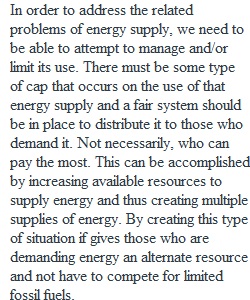


Q Currently, we (in the United States) depend heavily on fossil fuels for our energy needs. More than 80% of our electricity is generated from fossil fuels, and an overwhelming 98% of the energy used for transportation (cars, trucks, planes, etc) comes from fossil fuels. However, the demand for energy, especially coal and oil, is growing quickly in heavily populated developing countries such as China and India. Because there is a finite supply of fossil fuels and production rates have been unable to keep up with global demand, the price of fossil fuels has risen sharply over the last decade. There are also a variety of environmental consequences associated with fossil fuel use including air pollution, acid rain, and climate change. The uneven global distribution of fossil fuels, particularly oil, has led to political tension and conflict. Remaining oil resources are concentrated in handful of countries such as Venezuela, Iran, Iraq, Libya, and Saudi Arabia; countries mostly governed according to values very different from those held by the United States. What can or should we be doing to address the related problems of energy supply, national and economic security, and environmental protection? How can we reduce the demand for fossil fuels and promote other energy sources? What restrictions, if any, should we place on CO2 emissions from fossil fuels? What actions, if any, should we take to reduce energy demand or increase energy supply? What alternative energy sources should we invest in? What other issues should we be considering with respect to these problems? Due to increasing political polarization of science, which has led to paralysis in environmental policy as the major U.S. political parties can no longer even agree on whether a given problem such as climate change actually exists, a policy vacuum now exists in which these questions will be debated not by lawmakers but in courtrooms. In a landmark lawsuit set for trail in fall 2018, commonly called Kids vs U.S., a group of children are suing the U.S. government (first the Obama, when the suit was field, and now the Trump administration) for violating their rights to a secure climate. Read more about the case in the attached pdf below. My read of the case is that the plaintiffs have a strong case that U.S. policy is promoting climate change by encourage fossil fuel extraction and use over other energy resources by tax credits for oil and gas production and by promoting oil, gas, and coal extraction on lands managed by the government. The weakest part of the case is proving that the named plaintiffs has suffered specific and monetized damages due to climate change, and so I would expect the case to fail on the latter grounds. However, this case will open the door for more such cases in the future as the scientific grounds are strong and the Trump administration is not disputing them. While President Trump may regularly proclaim at campaign rallies and press conferences that climate change is not real or not attributable to fossil fuel use, this rhetoric does not work in a courtroom where evidence must be presented to support such claims. So as a result of this case the U.S. government will be on record as knowing about climate change, it causes, and the policies actions that promote it. Other plaintaffs with more direct harm from climate change, such as displacement due to sea level rise in places as far flung as Alaska and Bangladesh, will likely prove successful in future cases as U.S. culpability is established by the current case.
View Related Questions